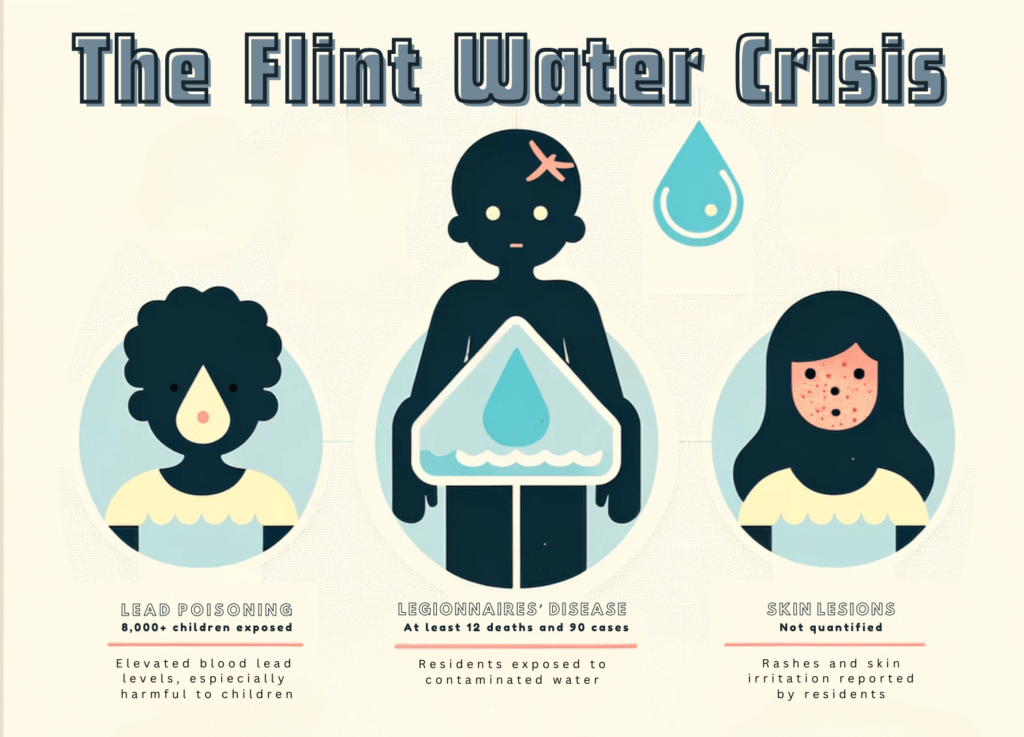
Flint Water Crisis: The Quest for Justice Amidst Systemic Failures
A comprehensive look at the Flint Water Crisis and its aftermath, examining the systemic issues and the ongoing fight for justice.
By Darius Spearman (africanelements)
About the author: Darius Spearman is a professor of Black Studies at San Diego City College, where he has been pursuing his love of teaching since 2007. He is the author of several books, including Between The Color Lines: A History of African Americans on the California Frontier Through 1890. You can visit Darius online at africanelements org
Key Takeaways:
- Investigation Closure: The Flint Water Crisis investigation concludes without criminal charges, leaving many questions unanswered.
- Supreme Court Impact: Michigan Supreme Court’s decision halts the indictment against former Gov. Rick Snyder.
- Charges Against Snyder: Snyder faced charges of willful neglect of duty, highlighting the legal complexities of the case.
Investigation Closure
The curtain falls on the Flint Water Crisis investigation, not with a bang, but a whimper. After years of legal battles, the quest for criminal accountability has ended, leaving the residents of Flint grappling with the fallout. The Michigan prosecutors, stymied by appellate court decisions, could not secure the convictions many hoped would bring closure to this environmental justice debacle (NewsOne).
The implications of this closure are profound, not just for Flint but for similar communities across the nation. It underscores the challenges of navigating the legal system in cases where public health and environmental justice intersect. The Flint Water Crisis remains a stark reminder of the systemic issues that can lead to such disasters, especially in predominantly African American communities.
Timeline of Major Events in the Flint Water Crisis (Click here to view in full screen)
Public Health and Environmental Justice
The Flint Water Crisis is not just a legal story; it’s a public health catastrophe and a stark example of environmental injustice. The predominantly Black and low-income residents of Flint were subjected to lead-contaminated water, resulting in a spike in lead poisoning cases and Legionnaires’ disease. This crisis has been a rallying cry for environmental justice advocates, highlighting the disproportionate impact of environmental hazards on marginalized communities (NewsOne).
The long-term health consequences for the residents are still unfolding, and the fight for clean water continues. The crisis in Flint has become a symbol of the broader challenges faced by communities of color across the United States when it comes to environmental health and safety. It underscores the urgent need for policies and actions that address the root causes of environmental injustice.

Supreme Court Impact
The Michigan Supreme Court’s ruling was a critical juncture in the Flint Water Crisis narrative. It effectively stopped the indictment against former Gov. Rick Snyder, who was charged with two counts of willful neglect of duty. This decision didn’t just impact Snyder but set a precedent that may influence future cases of governmental accountability (NewsOne).
The ruling raises questions about the role of the judiciary in environmental justice cases and the barriers to holding public officials accountable. It also brings to light the need for legal reforms to ensure that those in power can be effectively challenged when their actions—or inactions—harm the public.
Charges Against Snyder
In 2021, the spotlight turned to former Gov. Rick Snyder as he faced indictment. Charged with willful neglect, Snyder’s case became emblematic of the broader systemic failures that contributed to the Flint Water Crisis. The charges against him were a rare instance of a high-ranking official being held to account for decisions that led to a public health emergency (NewsOne).
However, Snyder’s legal team argued for dismissal based on the location of the filing, a technicality that would eventually contribute to the case’s unraveling. This legal maneuvering highlights the complexities of the U.S. legal system and the difficulties in prosecuting cases of governmental negligence.
Legal Technicalities and Dismissal
The legal battle over the Flint Water Crisis was fraught with complexities, one of which was the technicality that led to the dismissal of the case against Snyder. His defense argued that the charges were filed in the wrong court, a move that some saw as a loophole exploitation. This “fatal and incurable flaw” as described by Snyder’s legal team, highlights the often convoluted nature of legal proceedings and the ways in which they can be maneuvered to serve the interests of the powerful (NewsOne).
The dismissal on such grounds has sparked a debate on the accessibility of justice and the intricacies of legal procedures. It’s a sobering reminder of the gap that can exist between the letter of the law and the spirit of justice, especially in cases where communities are seeking redress for systemic wrongs.
Claims of Political Persecution
Former Gov. Rick Snyder’s response to the charges against him was to suggest that they were politically motivated. His relief at the case’s closure was palpable, as he expressed in his public statements. This claim of political persecution adds another layer to the Flint saga, intertwining the legal and political narratives in a way that complicates the pursuit of justice (NewsOne).
The assertion of political motives behind legal actions is not uncommon, but in the context of Flint, it raises critical questions about the interplay between politics and the law. It also serves as a reminder of the need for transparency and impartiality in legal proceedings, particularly when they involve political figures and public health crises.
Prosecution’s Struggle
The prosecution’s attempt to bring justice to Flint spanned over seven years and two attorneys general, a testament to the case’s complexity and the legal hurdles encountered. Despite their efforts, they were unable to secure a court date, let alone a conviction, for the residents of Flint. This struggle reflects the broader challenges prosecutors face when holding public officials accountable, especially in cases involving systemic issues and large-scale public health crises (The New York Times).
The prosecutors’ journey was fraught with setbacks, from the Supreme Court’s ruling to the dismissal of charges on technical grounds. Their dedication to seeking justice for Flint’s residents, however, remains a poignant narrative of perseverance in the face of institutional obstacles.
Victims’ Voices Unheard
Perhaps the most tragic outcome of the legal proceedings is the silencing of Flint’s victims. The end of the case means that the stories of those directly affected by the water crisis will not be heard in a court of law. The prosecutors expressed their heartbreak over this fact, stating,
“To deny the opportunity to present the evidence and to let the victims tell their story is truly heartbreaking.”
(The New York Times)
This sentiment echoes the frustration and despair felt by many in Flint, who have long awaited their day in court.
The absence of a trial not only denies victims the chance to share their experiences but also means that the public record will lack their testimonies. This has significant implications for the historical documentation of the crisis and for the ongoing struggle for environmental justice.
Continuing Infrastructure Issues
The Flint Water Crisis may have faded from the national headlines, but the city’s infrastructure issues persist. The replacement of corroded lead service lines is an ongoing process, with many residents still wary of the water that flows from their taps. These infrastructure challenges are a stark reminder of the long-term consequences of the crisis and the need for sustained investment in public utilities (Free Press).
The task of rebuilding trust in public water systems is monumental, requiring not just physical repairs but also a restoration of faith in the institutions responsible for ensuring safe drinking water. Flint’s experience has become a cautionary tale of what can happen when infrastructure is neglected, and public health is not prioritized.
No Convictions
In the end, the Flint Water Crisis case closed without a single prosecution, a result that many find deeply unsatisfying. The lack of convictions leaves a void where justice should be, and for many in Flint, the fight for accountability continues. The case’s closure without convictions is a painful reminder of the challenges in prosecuting cases of systemic failure and the limitations of the legal system in delivering justice for all (Michigan Capitol Confidential).
The absence of legal consequences for those deemed responsible by many in the community has implications for future cases of environmental injustice. It raises questions about the efficacy of the legal system in addressing and preventing such crises and the measures needed to ensure that those in positions of power are held accountable.
The Flint Water Crisis saga, with its unresolved legal battles and unhealed community wounds, stands as a stark reminder of the fragility of public trust in the face of systemic neglect. The absence of convictions does not mark the end of Flint’s story but rather underscores the resilience of a community that continues to demand justice and accountability. As Flint residents forge ahead, their experience serves as a clarion call for vigilance and advocacy to ensure that the basic human right to clean water is never again so grievously compromised.
In the broader context of African American history and the ongoing struggle for civil rights, Flint is a modern chapter in a centuries-old narrative of resilience in the face of adversity. The lessons learned here must inform future policies and actions to protect the most vulnerable among us. The Flint Water Crisis is not just a cautionary tale of what went wrong; it’s a roadmap for how we, as a society, can and must do better.
The dialogue on environmental justice, infrastructure integrity, and political accountability must continue, with the voices of Flint’s residents at the forefront. Their stories, their struggles, and their unyielding spirit will guide the way toward a future where such injustices are relics of the past, not headlines of the present.
